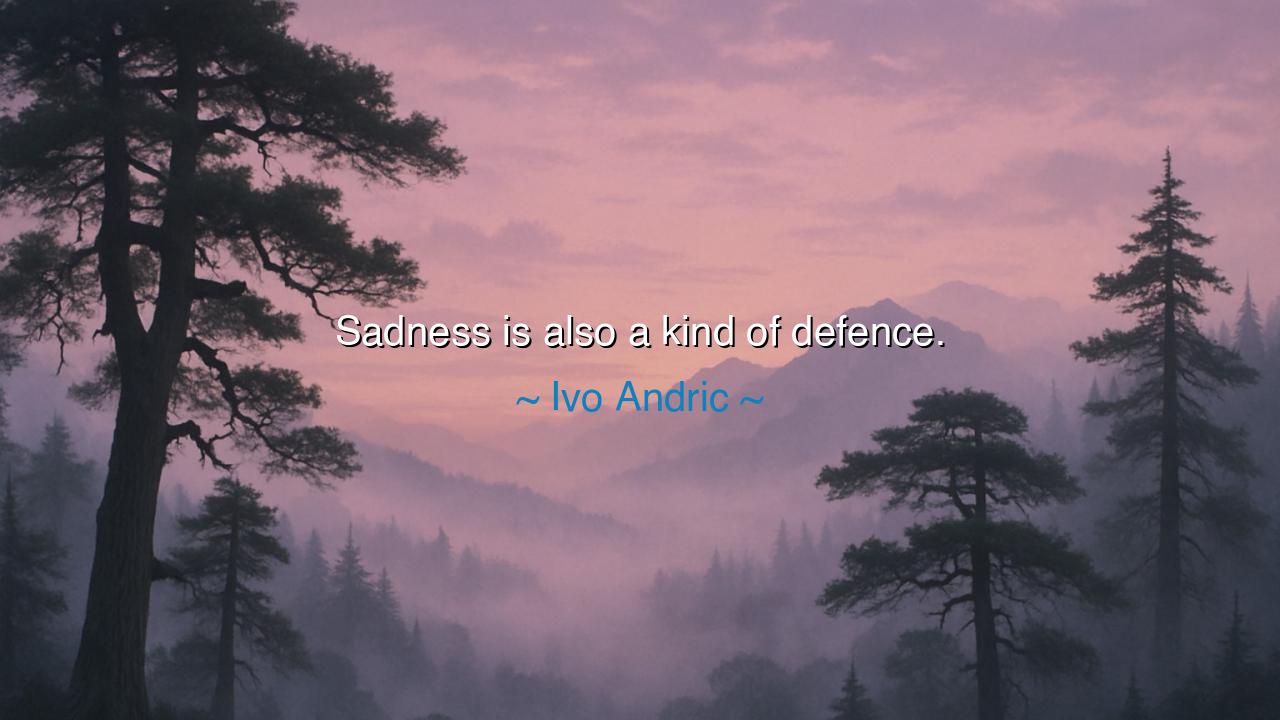
Sadness is also a kind of defence.






“Sadness is also a kind of defence.” — thus wrote Ivo Andrić, the wise chronicler of the human heart, whose words carry the melancholy of a soul that had seen too much of life’s cruelty and its fragile beauty. In this single, quiet truth, he reveals something profound about the nature of grief and self-preservation — that sadness, though often seen as weakness, can in fact be a shield for the soul, a refuge where the wounded heart withdraws to protect itself from further harm. Like the turtle that retreats into its shell, the spirit, when burdened, wraps itself in sorrow not to die, but to heal.
To the ancients, this wisdom would not have been strange. They knew that emotions, even the painful ones, serve purposes deeper than the mind can grasp. The philosopher Seneca, who wrote of grief and endurance, taught that sorrow is not an enemy but a necessary companion — a natural reaction of the soul when struck by suffering. It is the heart’s way of saying, “Enough. I must rest.” Thus, sadness, in Andrić’s view, becomes a barrier between the self and despair. It slows us down, it draws us inward, it demands silence and reflection. Without it, we might rush headlong into destruction, numbing ourselves with distractions, pride, or rage. Sadness, then, is not defeat — it is retreat for renewal.
Ivo Andrić himself was a man who knew much of sorrow. Living through wars, occupations, and the breaking apart of nations, he watched humanity at its most heroic and its most brutal. His novel The Bridge on the Drina bears witness to this — a world of endurance, where beauty and grief coexist. In his words, we feel the ache of those who have lost too much but still choose to live. For such a man, sadness was not simply an emotion; it was a protective wisdom — the heart’s quiet refusal to go mad from grief. Through sadness, one accepts the truth of pain without letting it consume the self.
Consider the life of Abraham Lincoln, who carried the weight of a divided nation and the deaths of countless men during the American Civil War. Those who knew him spoke of his deep melancholy — a sadness that never quite left his eyes. Yet that very melancholy was his defence, the means by which he endured. It kept him humble, compassionate, and human in the midst of unimaginable responsibility. It softened his heart when anger might have hardened it, and grounded his soul when power might have corrupted it. His sadness, though heavy, became the soil from which his wisdom grew. And so, even as he bore the pain of the world, he was protected by the depth of his sorrow — for it taught him empathy and guarded him from arrogance.
There is a strange nobility in Andrić’s claim, for it transforms sadness from a burden into a form of strength. When one grieves, the heart becomes sensitive, but also discerning. It learns what truly matters, and what does not. It retreats from noise, from vanity, from the chaos of the world, and finds safety in stillness. This is not cowardice; it is the instinct of the soul to preserve its light. The ancients compared this to the moon that hides behind clouds — though unseen, it remains whole. Sadness hides us for a time, not to make us lesser, but to help us survive until we are ready to shine again.
Yet there is danger too if sadness becomes a fortress without a gate. For the defence that protects can also imprison. The wise must learn to know when the heart has rested enough, when the walls of sorrow must open to the light once more. Andrić’s wisdom is not to glorify endless sadness, but to recognize its purpose — to let it guard us for a time, and then, gently, to let it go. To cling too long to sadness is to mistake the cocoon for the butterfly; we must emerge when the time for healing has passed.
So, my child, learn from this teaching: do not fear your sadness, and do not despise it. When pain comes, let sorrow do its work — let it slow your steps, let it quiet your spirit, let it protect you from the chaos beyond. But remember also that sadness is a guest, not a master. When your heart has regained its strength, rise again and step back into the world with clarity and grace. For in the end, as Ivo Andrić knew, sadness is not the end of life’s journey, but its pause — the breath before renewal, the defence before resurrection, the stillness before the next dawn.






AAdministratorAdministrator
Welcome, honored guests. Please leave a comment, we will respond soon